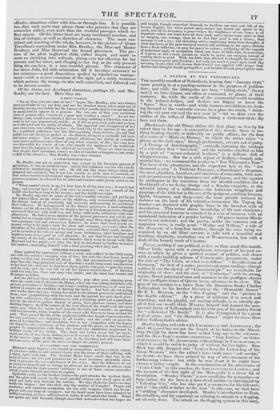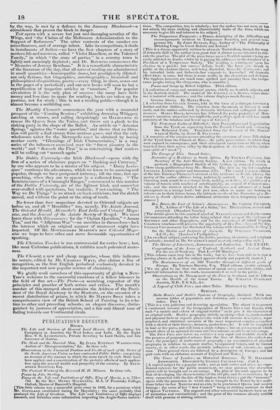A GLANCE AT THE PERIODICALS.
THE 1110ailly overflow of Periodicals, bearing date "January 1840," came pouring in at a pausing-moment in the progress of publica- tion ; and while the bibliopoles are busy " taking stock," (heavy task!) we have leisure, not often at command, to glance at their contents. So, while the credit of' the commercial world trembles in the balance-ledger, and dealers are fidgety to know the it figure" they're worth—and while feasters and bibbers arc look- ing forward to the venerable excuse for a glass too much, " drink- ing the old year out and the new year in "—let us skint over the surface of' the influx of Magazines, taking a duck-and-drake dip here and there.
Blackwood—for old Ebony claims the first place no less by his talent than by his age—is non-political this month : there is no- thing bearing directly or indirectly on public affitirs; for the first of' a series of " Hints on History," in which time writer takes " a glance at the dark ages," though preliminary, savours not of party. " A Passage of Autobiography," comically narrating the mishaps of' a schoolboy first " breeched," and the miseries entailed on him by a pair of " mouse-coloured leathers," is a delicate dish of whipped-creatn. But for a rich repast of drollery—homely sub- stantial fitre—we commend the reader to " Ten Thousand a Year." Time hero of the adventures, and the expectant heir to the " ten thousand a year," is Tittlebat Titmouse, a linendraper's shopman, the most pluckless, heartless, and brainless of coxcombs, with con- ceit proportioned to his ignorance and selfishness; and the agonies he undergoes ill his transition front the blissful condition (for a blockhead) of a week-day drudge and a Sunday exquisite, to the splendid misery of a millionaire—the ludicrous wrigglings and gaspings of the tittlebat in the net of the gudgeon-catching lawyers, Quirk, Gammon, and Snap—and the more pitiable tortures he endures on the hook of his releutless tormentor Mr. Tagrag his master—are depicted with graphic force in the broadest style of description. This writer shows knowledge of life and character ; and his practical humour is enriched by a vein of' sarcasm, with an occasional indication of a gentler feeling. Of graver matter Black- wood is not deficient ; and the poetry, unlike the common run of magazine verse, is really good: " Walter and William," a tale of flue discovery of a long-lost brother, through his voice being re- cognized by an old blind servant, is told with a beautiful and touching simplicity, reminding one of Woanswourn, but with a dash of the homely truth of Cat ABBE.
Fraser, nothing if not political, is less so than usual this month. Oliver Yorke opens with a complacent retrospect of his past ca- reer, in which he gives a spirited resum6 of politics, and closes with a castle-building scheme of Conservative governmeut, under the title of " The Crisis, or what is to follow." " Recollections of Germeny," the first of a series, promises pleasant reading—though neither it nor the sketch of "Constantinople" are remarkable for originality of view : and the story of " Catherine,".with its strong, coarse, literal painting of men and manners in the profligate classes of time profligate times of Queen AN NE, advances to its close. The gem of' the number is a letter from the illustrious flunky Charles Yellowplush to his brother litteratcur the " Honrabble Barnet" Sir E. L. BULWER, on the "Sea Coping" and the " preface to the fourth edition!" As a piece of' criticism it is sound and seswelling ; and the playful, yet cutting ridicule, is so adroitly ap- plied that one would think MacaNN himself' had donned the mas- querade livery of Yellowplush and held the pen of his pantry friend time " sellabrated Mr. Smith." It is also distinguished by a great deal of sense, and " the Honrabble Barnet" might do worse than follow Yellowplush's advice.
Bentley begins and ends with C UUJKSII AN I: and k t-1NSWORTII ; for Jack Sluppard has not got time length of his halter in the Miscel- lany, though his doom has been sealed loeg ago in the volumes: and the New-Year's number commences " Guy Fawkes," an histo- rical romance, by Mr. AINSWORTH, with etchings by C IKSHANK,--■ Which it WORN be anti& to judge of' without further lights. Sam Slick has slily dropped two "Letters from the Letter-bag of the Great Western" into the editor's box—with some " soft sawder," no doubt—to have them printed by way of advertisement of his fbrthcoming volume : but while he was about it he might have chosen a better sample. In the continuation of the adventures of " Colin Clink" in this number, the hero comes up to London ; and the account of' his first sight of the Metropolis is a clever bit of description. " Stanley Thorn," a new candidate for sympathy—or flune rather, for the hero is a dare-devil urchin—is introduced by " Valentine Vox," who has also got Cum KSILINK for his follower ; and it' "(lie child is father to the man " in this case, we shall have a "striking" character developed. Stanley's introduction to Eton, the rebellion, and his expulsion on refusing to submit to a flogging, are cleverly done. The attack tat the flogging system in this story, by the way, is met by a defence in the January Blackwood—a coincidence that proves the birch in danger.
Tait opens with a severe but just and damaging scrutiny of the Whigs, and "the Claims of the Melbourne Administration to the Support of Reformers." The other contents of the number are miscellaneous, and of average talent. Like its competitors, it deals in instalments of fiction—we have the first chapters of a story of modern life and manners, called " Violet Hamilton, or the Talented Family," in which " the state of parties " in a country town is lightly and amusingly depicted ; and Dr. Bowaixo commences the " Memoirs of Jeremy Bentham." It is a remarkable characteristic of the literature of the day, that all sorts of reading are administered in small quantities—homocopathic doses, but prodigiously diluted : not only fictions, but biographies, autobiographies, historical and philosophical disquisitions, poetry—every thing, in short, oozes out in the pages of a periodical ; and our new books will soon be but a republication of magazine articles or "numbers." For popular circulation it is the only plan of success : the many have little money and less time to spare for reading ; books are taken up for pastime, not for study : this is not a reading public—though it is almost become a scribbling one.
The Monthly Chronicle commences the year with a mournful prospect of the " Coming Session ;" exhibiting drowning Whiggery catching at straws, and calling despairingly on MELBOURNE to rescue the Queen from the Tories, and throw out a plank to his sinking party in the shape of the Ballot. An article on " Artesian Springs agitates the " water question," and shows that no filtra- tion will purify a foul stream from noxious gases, and that the only wholesome water for the Metropolis must be obtained by boring mother earth. " Gleanings of Irish Characteristics," is a racy satire of the influences exercised over the " finest pisantry in the world ;" and " Screech the First" is so entertaining that readers will be calling out "screech again."
The Dublin University—the Irish Biachwoad—opens with the first of a series of elaborate papers on " Banking and Currency," by one who appears to be a master of his subject. " harry Lorre- quer" continues his adventures, which we know to be amusing and popular, though we have postponed intimacy, till the time, fast ap- proaching, when they are to appear in a collected fOrni, " The Reminiscences of a Connaught Banger," commenced in tins number of the Dublin Unicemity, are of the lightest kind, and somewhat over-stuffed with quotations, but readable, if not exciting. " The 'Way we Do Things" is an attack on hack-criticism; but the sketch unreal, and without the point or the sting of truth.
No fewer than four magazines devoted to Oriental subjects are before us, and all " Monthlies" too namely, The Asiatic Journal, The Oriental Herald, Alavander's too, India and Colonial Maga- zine, and the Journal qf the Asiatic Society of Bengal. We must leave them with this (immure ; for the " Opium Question," " Assam Tea," and the "Affghaun War"—no novelties in themselves—lack the interest which an original manner of treatment might have imparted. Of Mr. MONTGOMERY MARTIN'S new Colonhri Maga- zine we hope to have other and more favourable opportunities of speaking.
The Christian Teacher is too controversial for notice here ; but, like most Unitarian publications, it exhibits much polemical acute- ness.
The Chemist, a new and cheap magazine, whose title indicates its nature, edited by Mr. CHARLES \VATT, also claims a line of recognition, as the first English periodical exclusively devoted to the important and now popular science of chemistry.
We gladly avail ourselves of this opportunity of giving a New- Year's welcome to the successful exertions of a fellow labourer in the field of fine art—The Probe—a searching expositor of the principles and practice of both artists and critics. The month's number of this stamped sheet contains the Address of the Presi- dent of the Royal Academy to the Students, on the occasion of a recent distribution of prizes, ill which Sir MARTIN SURE takes a comprehensive view of the British School of Painting in its rela- tion to other and preceding schools ; an elegant discourse, distin- guished by justness of appreciation, and a fair and liberal tone of feeling towards our Continental rivals.

































 Previous page
Previous page